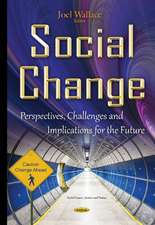Futures we are in: International Series on the Quality of Working Life, cartea 5
Autor F. Emeryen Limba Engleză Paperback – 19 apr 2012
Preț: 384.86 lei
Nou
Puncte Express: 577
Preț estimativ în valută:
73.65€ • 76.46$ • 61.41£
73.65€ • 76.46$ • 61.41£
Carte tipărită la comandă
Livrare economică 24 martie-07 aprilie
Preluare comenzi: 021 569.72.76
Specificații
ISBN-13: 9781468484908
ISBN-10: 1468484907
Pagini: 252
Ilustrații: 230 p.
Dimensiuni: 152 x 229 x 13 mm
Greutate: 0.34 kg
Ediția:Softcover reprint of the original 1st ed. 1977
Editura: Springer Us
Colecția Springer
Seria International Series on the Quality of Working Life
Locul publicării:New York, NY, United States
ISBN-10: 1468484907
Pagini: 252
Ilustrații: 230 p.
Dimensiuni: 152 x 229 x 13 mm
Greutate: 0.34 kg
Ediția:Softcover reprint of the original 1st ed. 1977
Editura: Springer Us
Colecția Springer
Seria International Series on the Quality of Working Life
Locul publicării:New York, NY, United States
Public țintă
ResearchCuprins
1. From Evolving Systems to Evolving Environments.- 1.1.1. Type 1: Random, placid environments.- 1.1.2. Type 2: Clustered, placid environments.- 1.1.3. Type 3: Disturbed, reactive environments.- 1.1.4. Type 4: Turbulent environments.- 2. Three Patterns of Maladaptive Response to Turbulence; Three Possible Scenarios.- 2.1. Superficiality: Marcuse’s scenario.- 2.2. Segmentation: the Orwellian scenario.- 2.3. Dissociation: Neumann’s scenario.- 3. The Doomsday Scenarios.- 4. Active Adaptation: The Emergence of Ideal Seeking Systems.- 4.1. Turbulence, values and ideals.- 4.2. A theoretical note on the parameters of choice (and hence decision making).- 4.3. The embodiment of ideals.- 5. The Most Probable Future for Western Societies.- 5.1. Probable futures in work.- 5.2. Education.- 5.3. The family.- 5.4. Life patterns: security, mobility and leisure.- 6. A Scenario for Asia and the West.- 6.1. China as the leading part in Asia.- 6.2. China and the leading role of the West.- 6.3. China and the U.S.S.R.- 6.4. China and the rest of Asia.- 6.5. Japan.- 6.6. ‘Maphilindo’.- 6.7. India.- 6.8. India 1976: a new path?.- 7. Notes for a World Scenario.- 7.1. The ‘Third World’.- 7.2. International co-operation about international concerns.- 8. Epilogue: Social Sciences and Social Futures.- 8.1. Social science roles.- 8.2. Examples of ethical problems.- 8.3. Conclusions.- Appendix I. Social Forecasting.- A. Methodological premises of social forecasting.- B. Forecasting social futures as a problem in reduction of complexity.- C. The problem of detecting emerging processes.





















